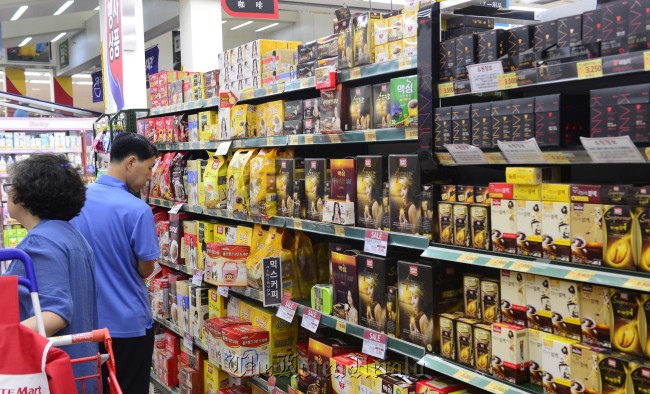Namyang seeks to challenge Dongsuh by building nation’s largest factory
A three-way battle is foreseen in the domestic market for individually packaged instant coffee mix products, which has so far been dominated by Dongsuh Foods’ Maxim brand.
Korea’s annual demand for the three-in-one coffee mix sachets that contain powdered coffee, powdered cream and sugar for a single serving is estimated at 1.2 trillion won ($1 billion), or more than a third of the coffee market.
The coffee mix business is attractive also because it shows high operating profit to sales ratios of nearly 20 percent, when other items rarely see operating profits of more than 5 percent of revenue.
Driven mainly by the high profitability, Namyang Dairy Products and Lotte Chilsung Beverage, the nation’s largest beverage maker, are stepping up efforts to grab a bigger slice of the market.
Namyang Dairy said on Monday it will build a factory that can produce 5 billion instant coffee mix packets, or 7,200 tons worth, annually.
A three-way battle is foreseen in the domestic market for individually packaged instant coffee mix products, which has so far been dominated by Dongsuh Foods’ Maxim brand.
Korea’s annual demand for the three-in-one coffee mix sachets that contain powdered coffee, powdered cream and sugar for a single serving is estimated at 1.2 trillion won ($1 billion), or more than a third of the coffee market.
The coffee mix business is attractive also because it shows high operating profit to sales ratios of nearly 20 percent, when other items rarely see operating profits of more than 5 percent of revenue.
Driven mainly by the high profitability, Namyang Dairy Products and Lotte Chilsung Beverage, the nation’s largest beverage maker, are stepping up efforts to grab a bigger slice of the market.
Namyang Dairy said on Monday it will build a factory that can produce 5 billion instant coffee mix packets, or 7,200 tons worth, annually.

The company said it will spend 180 billion won to build the nation’s largest coffee plant that is scheduled to start running in October next year in Naju, South Jeolla Province.
The company sent about 30 experts to the U.S., Germany and Spain to benchmark advanced production systems of coffee plants.
“The factory is designed based on the company’s plan to grab a 50 percent market share,” a Namyang official said, portending a fierce showdown to take away Dongsuh’s market share.
Dongsuh had long maintained a market share of over 80 percent in the coffee mix business, with Nestle Korea taking up around 15 percent, until Namyang entered the market in 2010.
Aggressive marketing by Namyang pushed down Nestle’s share to under 6 percent. Its market share as of the end of April was 5.5 percent.
Dongsuh’s market share shrank to 72.2 percent as Namyang reached 19.2 percent as of the end of April at E-mart, Korea’s largest discount store chain. At Homeplus, the shares for Namyang and Dongsuh were 20.5 percent and 75.5 percent, respectively.
Namyang said it was making an investment that amounts to 22 percent of the company’s equity capital in the new factory despite the economic slump to concentrate on the coffee business.
Since the third quarter of last year, coffee started to account for a larger share of the dairy food producer’s sales than its key item powdered milk. The gap has widened with 75.1 billion won in coffee sales and 51.6 billion won in powdered milk sales in the first three months of this year.
Kim Woong, chief executive of Namyang, stressed that unlike Dongsuh, his company can invest heavily in quality as it does not pay any royalties. Dongsuh pays royalties to Kraft General Foods under technological transfer and joint venture contracts.
“The existing coffee company pays tens of billions of won each year to the U.S. as royalties, but we don’t pay a penny,” Kim said at the plant’s groundbreaking ceremony.
“The money we save here is invested to stimulate the local economy and improve the quality of our coffee.”
Namyang said its existing production facilities and ingredient suppliers will focus on products for domestic sales, and the new factory will make mostly products for export.
Currently, Namyang produces about 2 billion coffee mix sachets annually using facilities within its milk and powdered milk factories in Gongju and Cheonan in South Chungcheong Province.
The company is eyeing the Chinese market where the demand for coffee mix products has risen by more than 12 percent each year since 2005. Nestle of Switzerland and Kraft General Foods of the U.S. are the main suppliers in China.
Namyang, which currently exports “French Cafe” coffee mix products worth about 3 billion won annually to China, expects the demand to continue to grow. The company targets 50 billion won in exports to China in 2014.
Meanwhile, Lotte Chilsung, which has so far had a weak presence in the coffee mix market, is bolstering its product lineup.
Lotte Chilsung unveiled last week stick-type products containing ground coffee named “Cantata Mild Gold” and “Cantata Rich Gold.”
By Kim So-hyun (sophie@heraldcorp.com)
-
Articles by Korea Herald


![[Weekender] Geeks have never been so chic in Korea](http://res.heraldm.com/phpwas/restmb_idxmake.php?idx=644&simg=/content/image/2024/05/16/20240516050845_0.jpg&u=)


![[News Focus] Mystery deepens after hundreds of cat deaths in S. Korea](http://res.heraldm.com/phpwas/restmb_idxmake.php?idx=644&simg=/content/image/2024/05/17/20240517050800_0.jpg&u=)

![[Herald Interview] Byun Yo-han's 'unlikable' character is result of calculated acting](http://res.heraldm.com/phpwas/restmb_idxmake.php?idx=644&simg=/content/image/2024/05/16/20240516050855_0.jpg&u=)

![[Photo News] Seoul seeks 'best sleeper'](http://res.heraldm.com/phpwas/restmb_idxmake.php?idx=644&simg=/content/image/2024/05/18/20240518050098_0.jpg&u=)

![[KH Explains] Why Korea's so tough on short selling](http://res.heraldm.com/phpwas/restmb_idxmake.php?idx=644&simg=/content/image/2024/05/19/20240519050115_0.jpg&u=20240519162247)







